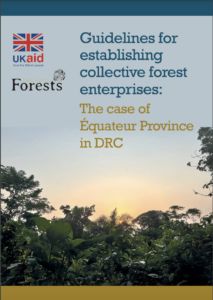The Democratic Republic of the Congo (DRC) is the second largest country in Africa, and one of the richest in the world in natural resources. With about 80 million hectares of arable land and 1100 minerals and precious metals, the DRC has the resources to achieve prosperity for its people. The Equateur province in north-western DRC includes seven territories and covers 104,000 km², of which about 87,000 km² (84 percent), is mostly forested. Against a backdrop of strong demographic growth and expansion of extractive activities, pressure on forests has been growing exponentially. For a long time, forest communities lacked legally recognised rights over their forests, limiting their ability to control and profit from the natural resources on the customary lands.
Tenure security is widely recognised as an essential precondition for sustainable development and particularly for creating a sustainable environment for forest businesses to operate. In 2016, the DRC took a momentous step in this direction and signed into law a Ministerial Decree No.25, which completes the legal framework that enables forest communities to secure their collective lands for the first time in the country’s history. Through the allocation of ‘Community Forests’, local Bantu and Indigenous groups living in forest settings within DRC can obtain perpetual rights over their traditional lands, as well as the ability to manage them for a diversity of purposes, including conservation, agriculture, fishing and smallscale logging.

